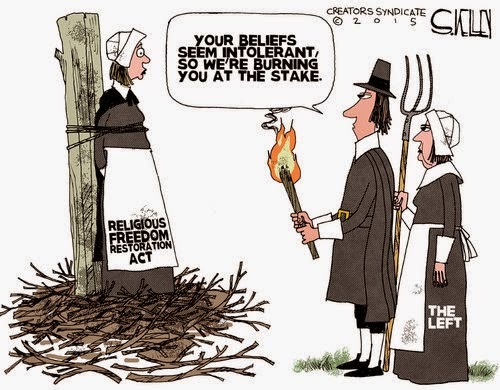You’ve probably heard by now about Indiana’s horrible new anti-gay law.
That would be the one signed by Republican Gov. Mike Pence, allowing
religious people to exempt themselves from any generally applicable law
they feel like and permitting businesses to discriminate against gays.
No shoes, no shirt, no heterosexuality, no service.
Celebrities and all right-thinking people are boycotting the new
“hate state” over its discriminatory return to the dark ages. There’s
just one problem: the law doesn’t say any of these things.
Indiana’s Religious Freedom Restoration Act doesn’t give blanket
permission to businesses to deny service to gays or anyone else. (If a
business truly wants to avoid serving sinners, it will have zero
customers.) It doesn’t mention sexual orientation at all.
What it does say is that government entities in the state “may
substantially burden a person’s exercise of religion” only “in the
furtherance of a compelling government interest” and using “the least
restrictive means of furthering that compelling government interest.”
Frankly, that should be the requirement for all government action, even when religion isn’t involved.
If a person feels their free exercise rights have been or are likely
to be substantially burdened, they can make a legal claim or assert this
as a legal defense.
Whether that person’s legal argument would prevail or not is ultimately up to a judge.
That’s it.
The federal Religious Freedom Restoration Act has been on the books
since 1993, passed by a Democratic-controlled Congress and signed into
law by President Bill Clinton.
It was enacted in response to a Supreme Court decision in which
Antonin Scalia wrote the majority opinion. Ted Kennedy, Charles Schumer,
Harry Reid, Joe Biden, John Kerry, Barbara Mikulski, Paul Wellstone,
Barbara Boxer and Russ Feingold were a few of the senators who voted for
it.
Jesse Helms was one of only three senators to vote against it. Former Klansman Robert Byrd was another, for all you out there who think religious freedom laws will usher in a new Jim Crow.
After the Supreme Court held that this law generally applied only to
the federal government, states began to pass their own versions. One was
Illinois, where the Religious Freedom Restoration Act passed the state senate unanimously in 1998 – including the vote of Barack Obama.
With 40 percent of the country living under state-level RFRAs and the
federal version being in effect for 22 years, we have not seen a huge
surge in courts ruling in favor of discrimination against gays.
Indiana doesn’t ban private sector discrimination on the basis of
sexual orientation in the first place, so businesses inclined to
discriminate don’t necessarily need to sue under a religious freedom
law. It doesn’t appear that many are so inclined.
In fact, large corporations are protesting the new Indiana law — just as hundreds of them have also asked the Supreme Court to declare a constitutional right to gay marriage.
Read more:
ANTLE: Indiana's Religious 'Anti-Gay' Law That Wasn't | The Daily Caller





No comments:
Post a Comment